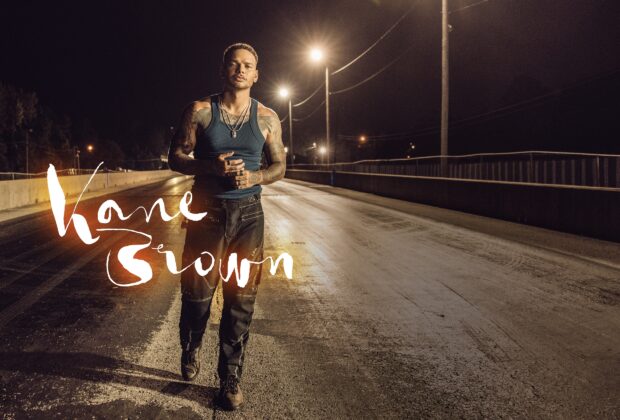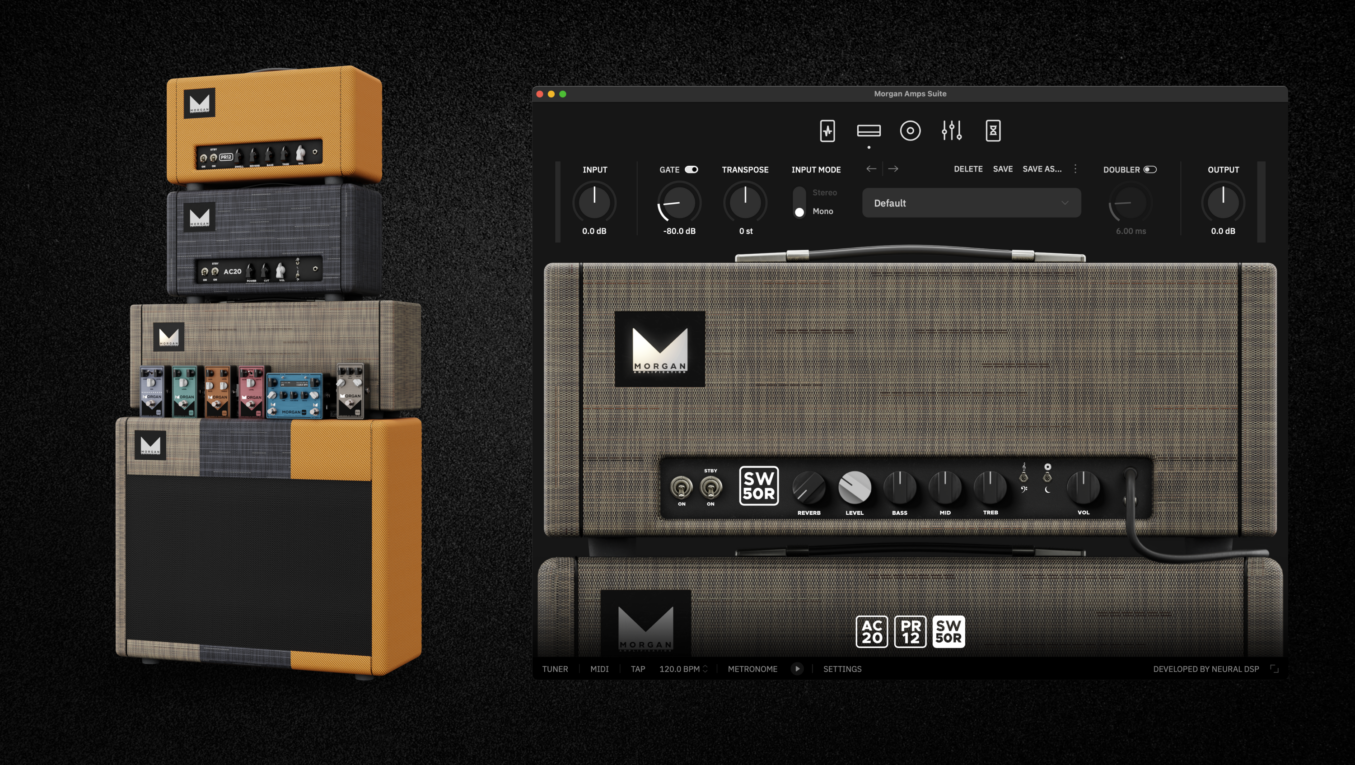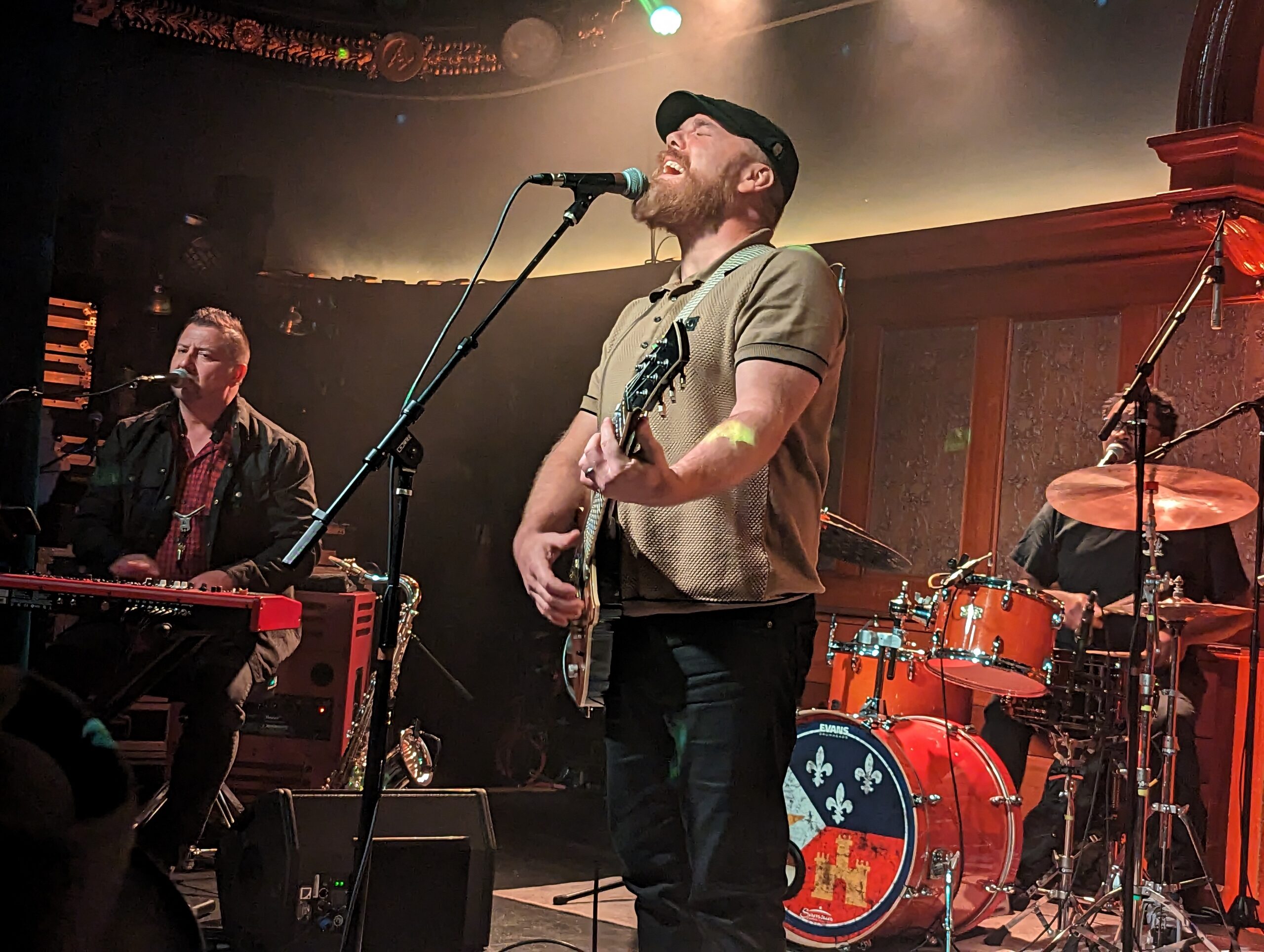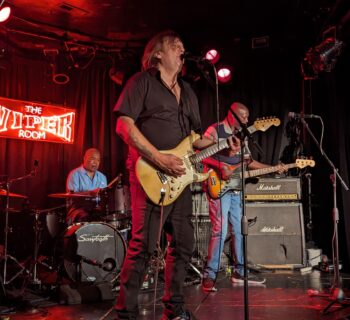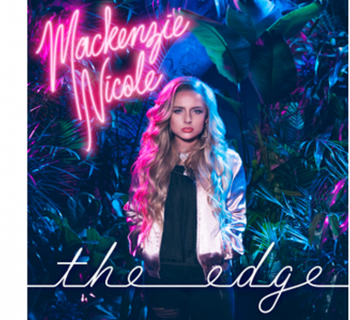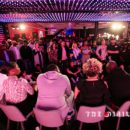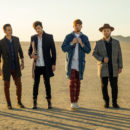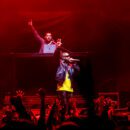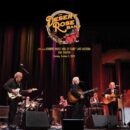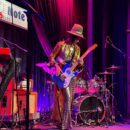Photos by Angelea Presti
Tattooed, pierced, multi-racial: Kane Brown is an eminent arena-packing music sensation blazing his own path to country music fame. First emerging on social media singing covers, and releasing a crowd-funded EP in 2015, he has earned 10 chart-topping No. 1 singles on country radio. Now headlining sold- out international tours and stadium dates, his latest collection is aptly titled Different Man.
Growing up with an imprisoned father, Kane Brown moved between hardscrabble northwest Georgia and small town Tennessee—sometimes living in a car with his mother, and suffering a stepfather’s physical abuse. Remarkably, he kept his life on course. For this exclusive MC interview, he speaks of collaborative songwriting, show-stopping stagecraft, the strength of family, and the ever-expanding inclusion of modern country music.
Music Connection: We enjoyed hearing your duet with Elvis Presley on “Blue Christmas” this past holiday season. The King and the Kane—that is quite a combination.
Kane Brown: Honestly, I was so excited. I did a rendition of the song last year. And when they came back and said they were going to throw him on there, I was blown away. It was out of this world crazy. I got to talk to some of the people who worked with him, and they said they saw a great amount of similarities—with both of us breaking barriers, with people telling us, “No, you can’t do this,” but we did it anyway. This was awesome, coming from people I’ve met who actually knew him. But I would never compare myself to The King.
MC: One of your new tracks, “I Can Feel It,” is built on a sample from “In The Air Tonight” by Phil Collins. The result is certainly a dramatic reset of traditional country songwriting.
KB: We were originally trying to get Phil Collins out to the Stagecoach Festival in Coachella that I played. We were in the writer’s room the next day, and he was still on our minds, and the song just wrote itself. I haven’t had a chance to play it live yet, but we’re going to use it for a huge onstage production. It’s going to be amazing. I haven’t met Phil Collins, but hopefully if this song goes to N0. 1, I will get a chance to.
MC: What is it like playing Stagecoach?
KB: It is so much fun. The first year I played at maybe 4:00 p.m. The second time was right before direct support, and this time I got to headline. It was the best feeling in the world. We also got the big screen right when they switched it from Coachella (Valley Music and Arts Festival), so I had even more reason to be excited. I remember showing up, and just seeing that huge LED wall which is what I love in production. When I saw that, I was ready to go. I had so many friends, and people I work with in the industry show up, it was surreal.
MC: Your most recent album, Different Man, begins and ends with songs about Georgia, your birth state. Why are there so many classic songs about Georgia?
KB: Georgia, of course, is my home. I would die for The Dawgs (the University of Georgia’s Bulldogs football team.) It’s beautiful place, with beautiful songs about it. I ain’t got much else to say, other than that.
MC: Your song “Bury Me in Georgia” is a barnburner. The guitars on that track are like flame throwers.
KB: Yes, that’s (producer-guitarist) Dann Huff for you.
MC: We saw a self-effacing reference to your musical abilities, with the modest description that you play “Campfire guitar.”
KB: I’ve got your basic chords. When I was doing covers, I learned off of YouTube. It’s funny now when I see people covering my songs, and teaching others how to play them, so it’s a full circle moment. I’ve got your G-B-A-C-C minor… then I get to the bar chords and I give up. I’m not going to be a shredder, or the guy who is solo playing. I like to run across the stage.
MC: As a co-writer, what do you bring to the collaborative environment?
KB: Songwriting is so difficult. Once you find your place, that’s what you’ll be good at. I look at myself as kind of like an A&R of the writer’s room. Sometimes I will bring the title. I used to do that more, much earlier in my career. Now when I come in, I know which people I work well with and which writers will work the best together.
MC: Can you tell us more about this selection process?
KB: It’s what I’m feeling. There are some writers who can do everything, and others who do sad ballads. So if I’m feeling depressed, I’m going to bring my guy Josh Hoge in. I mean he can do everything—he’s on “Bury Me in Georgia”—but that’s his sweet spot.
MC: You are also the artist who will personify the song onstage, and project its narrative.
KB: If any writer is working with an artist, and you have an idea, and that artist isn’t loving it, move onto something else. I’m not afraid to say “no.” Not every artist will, but if I don’t like something, I’m going to tell them. And these are the people I write with. And they’ll say, “OK—let’s move on and find something else.” I also try to write songs that will most likely be singles. It’s pointless for me to write a song that’s just a cut, unless it’s a story song that’s going to touch people, regardless. But even those will go to radio.
MC: Nashville writers have spoken to us about the concept of “Putting furniture in the room” in lyrics—creating tangible, visual impressions.
KB: The more imagery the better: I just wrote a song the other day with the lines, “The floor is covered with shattered shards of glass.” I was real upset, and I got inspired; that’s why I wrote that lyric. I really try to just be different. A lot of songwriters are just saying the same thing. I heard a Morgan Wallen song that was about beer, which has been done many times in country, right? But the way this song, ”More Than My Hometown,” said it is, “I love you more than a California sunset/More than a beer when you ain’t 21 yet.” That’s what’s clever, and different; a new way of writing about something that others have written about before.
MC: Your songs feel conversational and real—especially when the lyrical tone is darker.
KB: I don’t always release those songs, because I love my marriage (laughs). But as an artist, you have to break out of the box, because within your group of fans not everyone is happy, and they will relate more to the sad songs. Everybody breaks down at some point. If you’re not singing about them, then you’re not appealing to them. The hardest part is writing a song, and not lying. If you sing a song with deep emotion, people are going to portray that song as you.
MC: Your song “Grand” has songwriter Mike Posner in the writers’ credits. We think of him as a fascinating, and seemingly inexhaustible lyricist.
KB: Yeah. He’s also one of the sweetest guys in the world, with great energy. Sometimes if you get in the room –especially with first writes – you can check out if you’re not into it. With Mike, there’s no checking out. Positive energy, nice guy, lots of lyrics, stays focused the whole time. You don’t see him picking up his phone, he’s always working. I love writing with him.
MC: Do you book blocks of time for writing songs?
KB: I have my own publishing company, Verse 2 Music, a joint venture with Sony Music Nashville. It’s Kent Earls and me. I brought him over with me from Universal (UMG). Kent is the head of all the writers, so he books their schedules and he books my schedule. Right now I’m trying to get an album out, so I am trying to write as much as possible. That’s when I will book my own schedule. I recently put a studio in my house, so I never have to leave home again. I have people come over all the time.
MC: Which program do you use for recording, Logic or ProTools?
KB: We have both on the computer, but my preference is generally ProTools.
MC: Do you have a live room?
KB: Yes sir.
MC: Neighbors don’t come banging on the door complaining about the noise?
KB: Nah, we’re pretty secluded.
MC: We read that “I Love Country Music” was written at a writers’ retreat.
KB: We’ve been doing writers retreats here in Tennessee—but this time we went down to Florida. Writers’ retreats are when you get a bunch of writers that you work with a lot. You go out away from y’all’s house—no babies, no girlfriends, no wives, and no distractions, and you just write. We were on a lake when we wrote that one.
MC: Different Man has 17 tracks—that’s a generous outpouring of music.
KB: I forgot that’s how many songs are on that album. Mostly I was trying to make everything uptempo. I’ve tried to stay away from the slow songs. I look at my live shows, and think single-wise, and just try to write songs that are rocking as much as possible. Those are the hardest songs to write. We got a good amount on Different Man. I wish there were a couple more that were singles.
MC: “Pop’s Last Name” is a beautiful sentiment
"I grew up without a father
He’s been locked up since ‘96
But there’s another man, he ain’t here no more
That raised me as a kid"
MC: Is it difficult to be that revealing within a song?
KB: I’m an open person. I will always tell others how I am feeling. If you upset me in any way, I can’t fake that smile. My face is going to show it. It really comes in my writing too. A lot of times I have even deeper lyrics. I have people who have to tell me, “I don’t know boss, that’s awful dark—that’s out there.” I don’t feel like it’s bad at all being vulnerable.
MC: A line from the song says: “He said, ‘knowledge over power.’”
KB: he never really told me that, but I remember we didn’t have money, so he’d have to fix stuff. This is what I’ve learned since being an artist. I thought that line would be something he would say if he did have money. For me, coming from where I come from, and knowing what I knew, whenever I didn’t have money, I’d rather know how to fix something than have the money to pay someone else to do it.
MC: On your 2023 “Drunk or Dreaming Tour,” you headlined Fenway Park in Boston, selling out all 37,755 seats in the venue. How do you maintain intimacy on that massive scale?
KB: I was so excited. The adrenaline was crazy. But when you get up there, you really only see the people in front of you, and the flashlights in the stands. It almost feels like a club. I know it sounds weird to say, but you don’t see how big the atmosphere is until I started walking the stadium and it was crazy. I’ve learned to go out and perform, and try to make everybody feel like I love ‘em, as much as I do, even though they are a baseball field away from me.
MC: In the past you have told stories from your life as well, to keep the human elements in the show. Now you’ve this epic production and pyro happening.
KB: Yes sir. I think that’s the hardest thing for me. It’s been two years since I switched to this big live performance thing as opposed to my storytelling. I’m really excited for this next tour. We finally got a B stage where I can do the intimate-type stories. I used to do a fan favorite that made everyone tear up called “For My Daughter.”
"They say history repeats itself
Well, I guess that’s up to me
Yeah, I grew up without a dad
I’m gonna be the best one I can be"
There were video projections of my family and me. I want to incorporate more of that into my show, rather than just the pyro and energy.
MC: Do you work with a creative director on your live presentations?
KB: Yes. He’s been with me for six years now. His name is Alex Alvga. He also does my music videos. He’s super talented.
MC: You now have a record label, 1021 Entertainment—a joint venture with Sony Music Nashville, and also the Sony-affiliated publishing company, Verse 2 that you mentioned. One of your signees to the publishing company is your co-writer Levon Grey. How did you meet him?
KB: I found him in Alabama. He did a couple of songs on social media, and tagged a couple of other artists along with me. I researched him, and reached out. He was writing all of these songs by himself. I said, “Man—if I get you in a room with me and a couple of other writers, I wonder what we could create?” I brought him in, did the A&R thing I was telling you about, and we wrote “One Mississippi” the very first time we ever wrote.
MC: On Different Man, you assumed co-producer responsibilities. What does that expanded role entail?
KB: It’s just a little more paying attention. When I came in as a new artist, I used to go in with Dann Huff, give him the demos, and think that my job was done. “This is what I have, and I’m going to trust you to turn it into what it should be.” With this album I knew exactly what I wanted—I was going more into this show thing. I was telling Dann what I wanted. I could hear sounds. People ask me, “What do you listen to?” I literally don’t listen to any music other than what I am writing. The radio might be on every now and then, but other than that, I will listen to a song I wrote last week a thousand times—try to hear different sounds, and lyrics.
MC: Clearly, with your success, more artists of color, and LGBTQ+ representation, country music is changing.
KB: I think it’s wide open right now. Country music is changing like crazy. People said I was the frontrunner and I didn’t know how to take it. I’m glad that I’m not the only one now. I’m in my own kind of lane and I feel comfortable, but I didn’t feel that the first couple of years.
MC: Your visual identity projects your music, and it’s all you.
KB: You’ve got to be yourself. Coming in, I tried to be like everyone else. Growing up, I went to an all white school called Soddy-Daisy High School in Chattanooga. There were four colored kids in the school: Hispanic, Black, mixed. I was always in cowboy boots, all Bass Pro Shop. I’d go fishing, and we were mudding (off-road driving) everyday.
MC: Was it to a country soundtrack?
KB: I’d listened to country music since I was a baby, because my mom loved it. I got back into country music around the time that Florida Georgia Line was hitting, so I got to experience all of that. I moved in with a roommate, and he was telling me that I had no swag, he’s like “Bro—you’ve got to be different. Swag out, and make people look at you.” I started doing that, and that’s when I went viral. People thought I was a rapper, and I stood out.
Contact: Jennifer Vessio – 1220 Entertainment, jennifer.g.vessio@gmail.com
Meg Kehoe – Sony Music Nashville,
Meghan.Kehoe@sonymusic.com
Quick Facts
• Kane Brown’s father claims African-American and Native American heritage. His mother is Caucasian.
• One of Kane Browns classmates at Lakeview Middle School in Fort Oglethorpe, GA, was future country star Lauren Alaina. Breaking through as a first runner-up on American Idol, she encouraged Brown to audition for the show. He was rejected for sounding too much like Idol’s Scotty McCreary.
• X Factor tried to put him in a boy band, which he declined. Instead, he did his own covers online. His cover of Lee Brice’s “I Don’t Dance” went viral, with 60K shares overnight. A version of George Strait’s “Check Yes or No,” captured seven million views.
• Working for the home improvement store Lowes in Hixson, TN, Brown would sing in the aisles. His fellow red vest employees encouraged him to enter a talent show. He has since partnered with the store for the 100 Hometowns restoration project with the first recipient the local Boys & Girls Club.
• His first six song EP, Closer, financing with Kickstarter crowd funding, hit the country charts and attracted major label interest.
• Brown’s eponymous record-breaking debut album produced Diamond No. 1 hit “Heaven” and six-times Platinum No. 1 hit “What Ifs.” With his debut effort, Brown became the first artist in Billboard history to top all five country charts simultaneously.
• Working outside of the country idiom, Brown has collaborated with hitmakers like Khalid, H.E.R., Becky G and Marshmello.
• Kane Brown and his wife, singer-songwriter Katelyn Jae Brown, recorded a chart-topping duet “Thank God,” for Different Man. It became his 10th No. 1 single.
• Brown performed at NBC’s Christmas at Graceland—staged in December 2023 at Elvis’s Memphis home—featured with artists including John Legend, Post Malone, and Lana del Rey.
• The first black artist to headline Fenway Park in Boston, Brown will return on his 2024 “In the Air” Tour.

